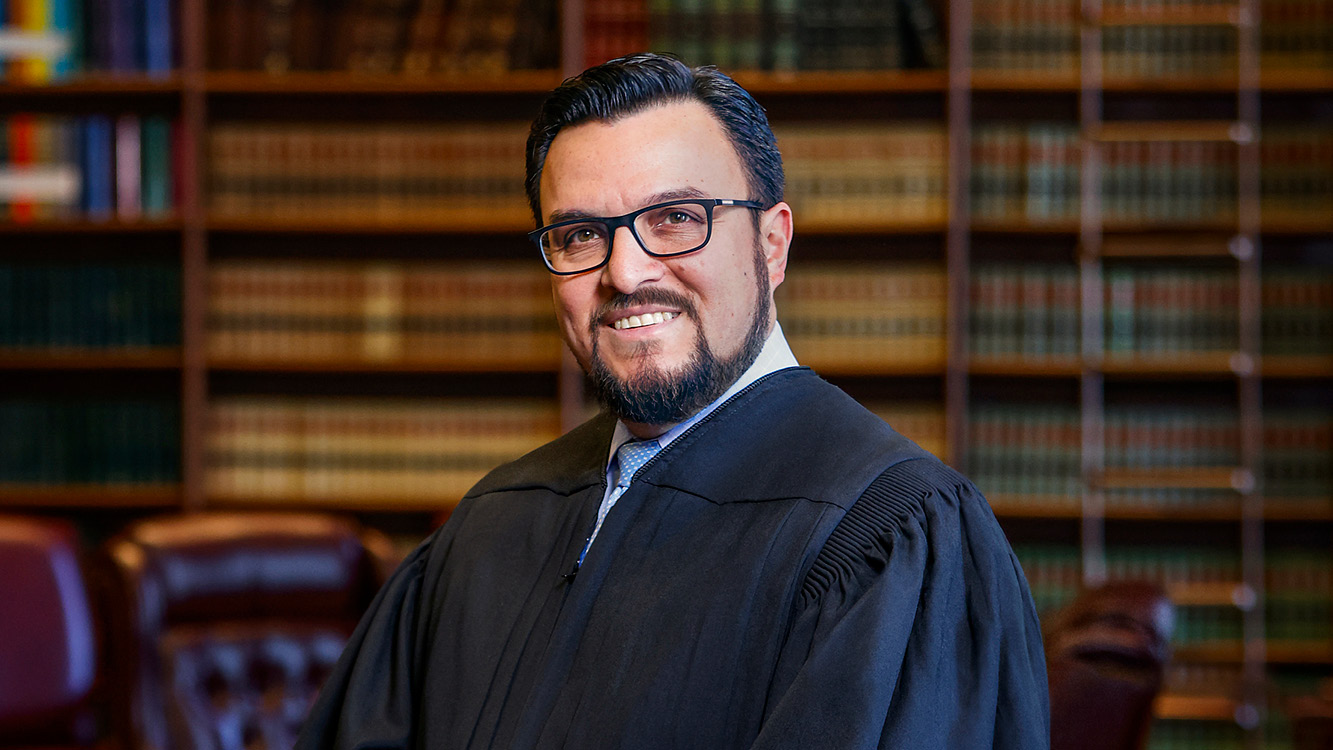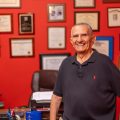By Kevin Coyne
On the day last summer when he was sworn in as the newest justice on the New Jersey Supreme Court, Michael Noriega, J.D.’02 took a few moments alone, before anyone had gathered for the ceremony, to survey the silent, empty courtroom where he would be serving. It is a hushed, austere, windowless chamber on the top floor of the Richard J Hughes Justice Complex in Trenton, and at the top of the state’s judicial system — the place where legal questions come to receive their final judgment.
Noriega had been there twice before, arguing cases before the court, but his two decades as a lawyer had left him more familiar with clamorous courtrooms where robberies, assaults, drug offenses, homicides and other felonies file through in wholesale lots. He spent his first five years after Seton Hall University’s School of Law with the state Office of the Public Defender in Essex County, handling as many as 150 cases at a time, and taking more than 30 to jury trials. He continued defense work in private practice and developed a specialty in immigration law.
Now he was about to become the first former public defender to serve on the state Supreme Court. When he was nominated by Gov. Phil Murphy, the governor said he wanted someone “who didn’t just learn how our judicial system works in a textbook but had the real-world experience of fighting for their clients and giving them the representation they are entitled to under the law.”
“Public defenders see firsthand how the law impacts ordinary people,” Murphy said. “A public defender does not get to choose their clients. More often than not, they represent individuals from our most marginalized communities in their greatest moment of need.”
Noriega sailed through his confirmation hearings, approved by a unanimous vote in the state Senate, the sweet realization of the future his father had predicted for him back in law school. He had moved back home to Union City after earning his undergraduate degree from Rutgers, commandeering as his study a room with a sliding window that opened onto the dining area. He pasted on it a Seton Hall logo with the scales of justice. The courtroom, his father took to calling it; “Judge,” he took to calling his son.
“And that was just what he called me for the rest of his life,” Noriega said of his father, a Peruvian immigrant, who died in 2011. “In his mind, a judge was the ultimate level of a legal career. He believed that it was a logical progression; you became a lawyer and eventually, a judge.”
On that day alone in the courtroom, Noriega measured the distance he had come. “I stood at my chair for a couple of minutes, looked out and couldn’t believe my good fortune that this would be my seat,” he said. “It was surreal, and I don’t know that it will ever stop being that way. And I’ve had to catch myself a time or two, while intensely focusing on the oral arguments, when I look around and see the other justices engaged in a dialogue with the attorneys and sort of lose myself in the moment, amazed by where I am.”
His father proved right about his son’s career trajectory, but not about the nomenclature. As the U.S. Supreme Court is the final arbiter of federal law, so is the New Jersey Supreme Court the final arbiter of state law, and the jurists who sit on those courts are not called judges. Michael Noriega was sworn in that day as Justice Noriega.
Noriega had less occasion for reflection on his first day in court in his first job as a public defender. A note was waiting on his desk when he arrived at his Newark office that first morning.
“Meet me at the courthouse,” it said. “I have your files.” He raced to the Essex County Veterans Courthouse and found his colleague in a ninth-floor courtroom with 16 case files. “And 10 minutes later, I was in the back in the holding cell speaking to a client before going on the record for the first time,” he said. “Baptism by fire to the nth degree.”
It was a probation violation case, and his argument on behalf of the client he had just met didn’t fly. “It was devastating, because minutes later they took him out in handcuffs and he was going into jail for a while,” Noriega said. “I felt like a tremendous failure my first time out.”
But failure or not, he was in a courtroom, which is where he wanted to be from the moment he decided he wanted to be a lawyer, as a Rutgers sophomore majoring in American Studies. Among the reasons he chose Seton Hall for law school was its vigorous moot court program.
“I assumed that my classmates wanted to be in a courtroom as much as I did,” he said. “I was shocked by how many people were not, that the majority of them wanted to be transactional. They were happy about the possibility of being at a desk, dealing with paper, contracts and such, and not having to stand in front of anyone to say anything.”
Whereas Noriega always had something to say, even as a boy growing up with two brothers in a small apartment. “It was an ongoing joke that people had been saying since I was little, that I just would not stop talking,” he said.
His parents met in medical school in Peru and were doctors working at a military hospital — his father a cardiologist, his mother an obstetrician — when they decided to follow the urgings of his mother’s two brothers, who had already settled in New Jersey. “My dad was moonlighting as a cab driver and it was tough making ends meet in Peru,” said Noriega. “It seemed like a much more promising endeavor here.”
One of his uncles had a job delivering computer parts for IBM, and to help stay awake on long drives he enlisted as his wingman his loquacious young nephew. “He would ask me to make sure to read a book beforehand so that I could explain it to him,” Noriega said. “So the first one I picked was The Stand, by Stephen King, which was the biggest book I could find, about 1,000 pages, and I did my best to recount the entire book for him from beginning to end.”
Noriega’s father worked in a cardiologist’s office, his mother as a nurse, and as a boy he watched their determined, and ultimately frustrated, efforts to become licensed to practice as physicians in the U.S. “I think that there were times when they almost abandoned being here,” he said. “But ultimately, they gave up everything, including their careers and families for us. They saw what the schools were like, they saw how we were doing and how we were growing. And they saw it as a better fit for us.”
His parents bought a small business — travel agency, tax preparation, insurance — and the building that housed it from some friends and moved into the apartment upstairs. The boys went to Catholic school, Holy Rosary Academy and then, for Michael, Saint Peter’s Prep. He met his wife — Melissa, a school psychologist — at Rutgers and he can still impress their four daughters by saying the “Our Father” in Latin.
He clerked for a judge, interned for the public defender in Bergen County and had applied to a dozen county prosecutors when a friend from the defenders’ office steered him toward an interview. The same day he accepted a job as a public defender he got letters from four county prosecutors offering interviews.
“I still believe that I could have started my career on the state side and it would have been just as rewarding,” he said. “The most exhilarating thing that a lawyer can do, in my opinion, is to stand up and argue on someone’s behalf, on either side — being the one responsible for those arguments and being a tool through which the victim, the state or the defendant can make their case known. Working with somebody to prepare for a trial provides insight into their humanity — watching them make decisions about the rest of their lives, regardless of the charges.”
After five years with the Office of the Public Defender, Noriega opened a private practice in Newark, sharing an office with a friend he met at law school, Remi Spencer, J.D. 02, who, after serving as assistant prosecutor in Union County, had also started her own practice. “Long overdue, for the court and for the state,” said Spencer, now a prominent criminal defense attorney and president of the law school’s alumni council, about Noriega’s appointment. “Public defenders and criminal lawyers bring a different perspective to the bench, and it’s a necessary one, because so much of what that court does is going to impact the way criminal trials are handled. And so to have someone who did that, who is so good at that, it’s just remarkable.”
Noriega taught appellate advocacy at Seton Hall Law, a required second-year class, for eight years as he built his practice, until he became a partner at the firm of Jon Bramnick, a Republican state senator. “He’s so engaging, so warm, so supportive, his students absolutely loved him,” said Lara Pennington, who taught another section of the class at the same time and now directs the appellate advocacy program at the school. “He’s got the perfect demeanor for somebody who metes out justice.”
There are no holding cells in the state Supreme Court, no anxious defendants, no stemwinding jury summations, no histrionic objections, no burly court officers to corral unruly families, none of the pathos and drama and tedium of the trial courts. There are just papers and words. A few days each month, Noriega and the six other justices file into the courtroom to hear what are called “arguments” — lawyers from both sides of a case trying to persuade them to uphold a decision the lower courts had made, or to overturn it.
“It’s not really an argument, I think that’s a misnomer,” said Pennington, who teaches law students how to write the kind of briefs the court reads and present the kind of oral arguments it hears. “It’s an intellectual conversation, and it’s an opportunity to explain and to answer judges’ questions and to address things that might be a little bit fuzzy.”
Noriega is now on the receiving end of the kind of appeals he used to write and present and teach himself. “There were always fires to put out, everywhere and in every direction,” he said about life before the bench. “Now it’s more focused work, less fire.”
More than 1,000 petitions reach the Supreme Court each year, some carrying thousands of pages of trial transcripts for the justices to review as they weigh which cases to accept; fewer than 100 make it to a courtroom hearing. One day in February, the case before the court was about a former teacher charged with sexual assault of a student.
The trial had been halted because of a dispute over the admissibility of the videotaped statement from the student, taken when she was 8. She was 15 when the case finally came to trial and said she could no longer recall three of the four incidents she had initially recounted to investigators. The trial judge ruled that her video statements about those three incidents could not be used as evidence; the appellate court disagreed and ruled that it could. Now it was the Supreme Court’s turn.
The case hinged on a constitutional issue: Would using the full video as evidence violate the defendant’s right “to be confronted with the witnesses against him,” as guaranteed by the Sixth Amendment?
Noriega had come to the court from the defense bar, and the first opinion he wrote was a dissent. The court ruled in that case that a warrantless search by police of a bag left behind by a fleeing suspect was permissible; Noriega disagreed. “A defendant’s criminal behavior is not an automatic license to short circuit the Constitution,” he wrote. But in his first question from the bench in this case, directed at the defense attorney who was arguing that the video would introduce evidence that could not be properly rebutted, he sounded more like the prosecutor he once thought he would become.
“To each recollection she fails to have you can ask the question, ‘Are you making this up?’ and you’ll get an answer, so where is the denial of an opportunity to fully have every question answered?” he asked the defense attorney.
“There is no opportunity to impeach her as to these allegations,” the defense lawyer said.
“You’re not entitled under the Constitution to impeach witnesses,” Noriega said. “You’re simply entitled to a fair cross examination.”
Then the attorney for the state stood to argue that the video should be admitted, and the question he got from Noriega came from the other direction. “She specifically did not recall those three incidents, she didn’t recall the incidents happening, she didn’t recall even speaking to the detective about them,” Noriega said about the girl. “Shouldn’t that be troubling to the state to present those aspects of the case as evidence?”
Supreme Court decisions aren’t rendered in the courtroom — they are issued in opinions many weeks later — and after an hour and a quarter on the fate of the video, the justices fi led out through the door behind the bench. Another case, bringing them another set of legal knots to untangle, awaited after lunch.
“That’s what good judges and justices do, probe both sides to make sure that they have fully answered the questions that they have about both perspectives,” Lara Pennington said, reflecting on Noriega’s abilities.
“But that also is just in keeping with who he is as very fair minded, as somebody who wants to find the right answer to the legal question—to the extent that a justice is capable of doing.”
Kevin Coyne is a freelance writer based in New Jersey.







